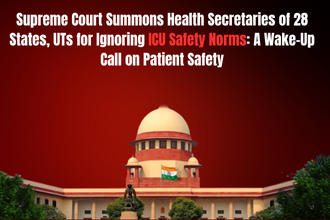A Public Interest Litigation (PIL) has been filed before the Supreme Court of India challenging the attempt by various individuals and corporations to trademark the term “Operation Sindoor”, the official name of India’s ongoing military operation against Pakistan. The plea, filed by Advocate Dev Ashish Dubey through Advocate Om Prakash Parihar, raises critical concerns about the commercial misuse of names associated with national grief, sacrifice, and military valor.
This PIL comes in the wake of 11 applications submitted to the Trademark Registry seeking exclusive rights over the name “Operation Sindoor” under Class 41—a classification that includes entertainment, education, media, and cultural services. Among the first to file was Reliance, which later withdrew its application following massive public backlash.
The issue has stirred a national conversation around the ethical limits of intellectual property rights, particularly in situations where national security and emotional integrity are involved.
What is Operation Sindoor?
“Operation Sindoor” is the codename for a recent military offensive launched by India against Pakistan in response to the tragic killing of tourists in Pahalgam, Jammu & Kashmir. The name holds deep emotional significance, especially among the families of the martyred soldiers and widows who bear the symbolic “sindoor” (vermilion), a traditional emblem of marriage and, by extension, sacrifice and loss.
The operation is not just a strategic military act but a symbol of national unity, grief, and valor. Naming a military action after “sindoor” metaphorically reflects the blood, honor, and sacrifices of those who lay down their lives in service of the nation.
What Does the PIL Say?
The PIL filed before the Supreme Court argues that:
- The commercial appropriation of “Operation Sindoor” for trademark purposes is an affront to national sentiment and the dignity of India’s armed forces.
- Such usage seeks to monetize collective grief and exploit patriotism for commercial gain, which is both unethical and legally impermissible.
- The registration of this term under Section 9 of the Trade Marks Act, 1999 must be barred as it violates public morality, hurts national sentiment, and lacks distinctiveness in a commercial context.
- The continued processing of these trademark applications opens the door to misuse in advertising, branding, or media, which could trivialize the operation’s real-world impact and undermine its solemn significance.
The petitioner therefore seeks a direction from the Supreme Court to restrain the Trademark Registry from proceeding with the registration of “Operation Sindoor” in any class, and to issue broader guidelines preventing the commercialization of names associated with military operations.
Legal Context: What Section 9 of the Trade Marks Act Says
Section 9(2)(b) of the Trade Marks Act, 1999 explicitly prohibits the registration of any trademark:
“…the use of which would be contrary to public order or morality or which is likely to deceive the public or cause confusion.”
The PIL argues that “Operation Sindoor” clearly falls within this ambit:
- It invokes national emotion and collective grief;
- Its commercialization could be viewed as offensive to public morality;
- It lacks a distinctive commercial identity, being originally a state function rather than a private initiative.
Thus, any attempt to register this term should be barred by law and considered legally untenable.
Ethical and Cultural Dimensions
Apart from the legal perspective, the PIL sheds light on the ethical dimensions of this issue:
- Public Grief Is Not for Sale: Commercializing a term that reflects national mourning dilutes the gravity of the moment and the sacrifice of soldiers.
- Branding a War Effort Is Dangerous: When military operations are branded for profit, it sends a dangerous message—turning state violence into entertainment or marketing tools.
- Widows and Families Deserve Dignity: The metaphor of “sindoor” is deeply tied to the identity of widows of martyred soldiers. Its misuse for commercial branding may cause psychological and emotional harm to bereaved families.
Corporate Backlash and Withdrawals
Reliance’s early attempt to register “Operation Sindoor” sparked immediate backlash from the public, veterans’ organizations, and legal professionals. Amid the uproar, Reliance swiftly withdrew its application, issuing a statement that it respected the nation’s sentiment.
However, 11 other entities continue to pursue the trademark, revealing a growing trend of corporate opportunism in the intellectual property space, especially in exploiting trending socio-political events for commercial branding.
The Larger Debate: IP Rights vs. Public Sentiment
The Operation Sindoor case has triggered a larger legal and philosophical debate:
- Where do we draw the line between free enterprise and respect for national symbols?
- Should there be a list of restricted terms or “protected names” in public interest?
- Does the IP framework need reform to incorporate emotional and cultural sensitivities?
Some legal experts have called for urgent reforms in trademark law, including the creation of a “blacklist” of national symbols, military terms, and commemorative expressions that cannot be trademarked.
Past Precedents and Global Comparisons
India is not alone in facing such dilemmas. Several countries, including the United States, Canada, and Germany, have strict restrictions on the trademarking of national defense-related names, public monuments, or memorial phrases.
In 2015, the U.S. Patent and Trademark Office rejected a trademark application for “Sept. 11” on similar grounds—stating that the term represented public tragedy and should not be commercialized.
India too has existing protections under the Emblems and Names (Prevention of Improper Use) Act, 1950, but its application to military operation names remains unclear, necessitating a more explicit legal mechanism.
Conclusion: Supreme Court’s Intervention a Moral Necessity
The PIL against trademarking Operation Sindoor is not just a legal fight—it is a moral and cultural battle to preserve the sanctity of national grief, honor the memory of martyred soldiers, and prevent the commodification of patriotism.
As the Supreme Court prepares to hear the matter, the nation watches closely, hoping that the judiciary will draw a clear ethical boundary in matters where commercial interests conflict with national integrity.
This case could pave the way for stronger laws and judicial precedents to protect names and symbols associated with military valor, sacrifice, and collective memory from being misused in pursuit of profit.


